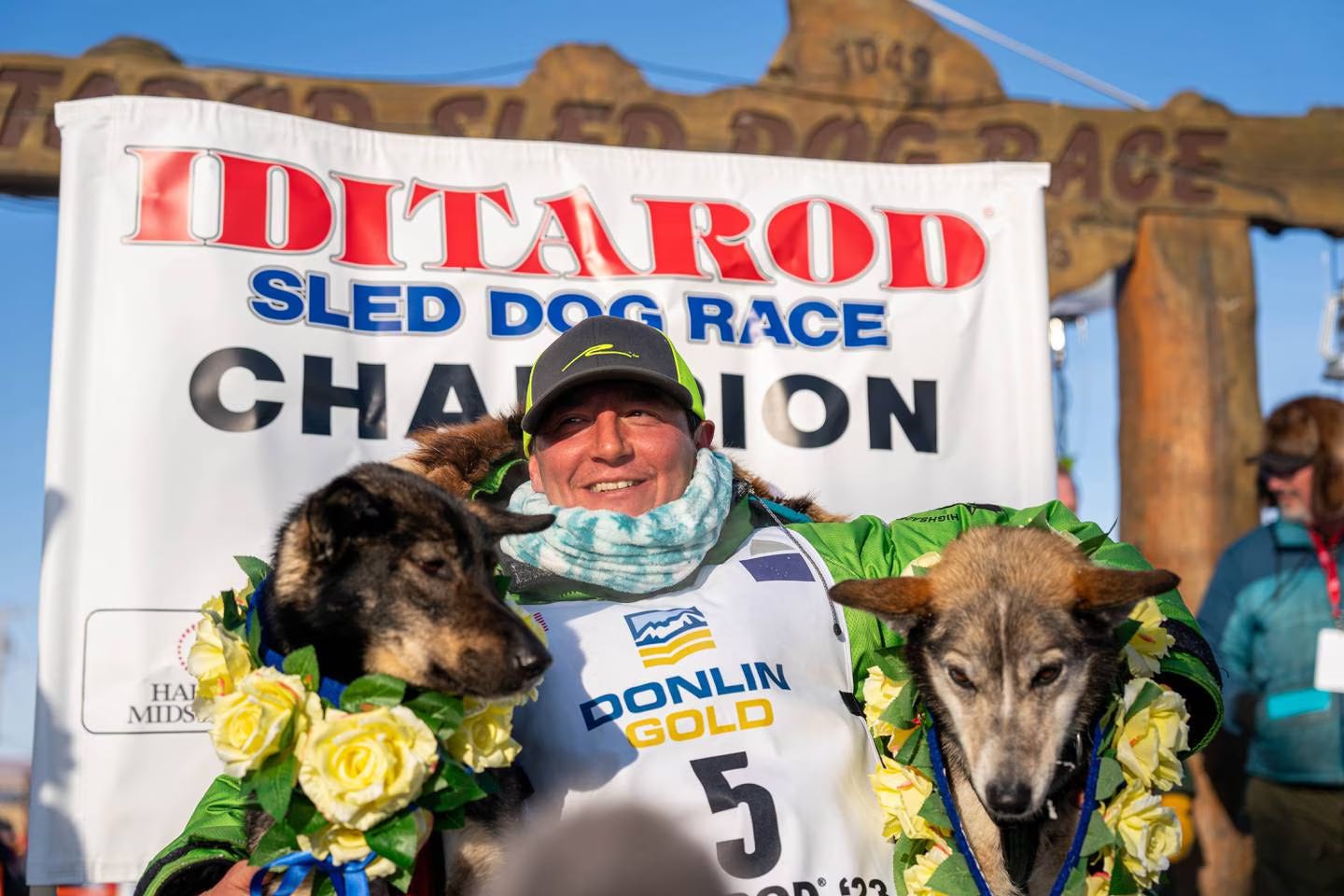“It’s Been a Very Doggy Life”: Ryan Redington’s Path to Iditarod History
How the grandson of the iconic race’s creator added his familiar name to record books
He appeared a little after noon, a dot on the horizon that grew larger and larger the closer he got, speeding across Bering Sea Ice and onto land in Nome, Alaska. The cheers grew louder as the anticipation built, and finally, Ryan Redington and his dogsled team, led by huskies Ghost and Sven, raced down Nome’s Front Street after covering nearly 1,000 miles over almost nine days.
“We’ve waited 51 years for this, ladies and gentlemen,” said the announcer to the crowd, who roared with delight.
Redington crossed the finish line at 12:13 p.m. to win the 51st annual Iditarod dogsledding competition, his 16th time running the race, and about 12 hours after he set out on the final leg of the trail. When he finished, Remington threw his dogs frozen bacon and hugged his mother.
Then Remington received a bronze statue presented annually to the champion, featuring a bust of “The Father of the Iditarod,” better known as Joe Redington, Sr. He just so happens to be Ryan Redington’s grandfather.
Back in the 1970s, Redington Sr. became alarmed when he saw young people in Alaska forgoing dog sleds in favor of snowmobiles as a form of transportation. An Alaska Native, Redington Sr. used dog sleds to travel, hunt, and survive the harsh climate. He didn’t want young people to lose that heritage, and so he worked to establish the Iditarod, known as “The Last Great Race on Earth,” that takes mushers through the frozen Alaskan wilderness.
Since he was a boy, Ryan Redington heard stories of his grandfather and learned to become a musher himself. Once when he was a boy, he wanted to train with his dogs in the middle of a blizzard. His father begged him to wait out the storm. “Martin Buser just won in a blizzard,” Redington replied, referring to the four-time Iditarod champion. The practice paid off: in the final hours of the race, visibility was so low that Redington could only see the two dogs nearest to his sled.
In all, six Redingtons have officially entered the famous race. But until this year, none had ever won it. “It’s been a very doggy life for all of us,” Redington said. “No days off. We think about winning the Iditarod.”
The win could not have come at a better time. Across Alaska, participation in dogsledding has been waning for years, driven by climate change and the accessibility of other forms of transportation like cars and snowmobiles. This year’s Iditarod featured the smallest field in its history, and the sport seems to be in danger of vanishing.
Redington’s win, though, brings hope. He’s only the sixth Alaska Native—he’s Iñupiat—to win the race, and in a unique wrinkle, the entire podium was made up of Alaska Natives as well. Pete Kaiser and Richie Diehl finished in second and third place. “It’s almost unheard of,” said Kaiser, who won the race in 2019, and indeed it is. It’s the first time ever Alaska Natives have finished first, second, and third.
“It took a lot work, took a lot of patience. And we failed quite a few times, you know?” Redington said. “But we kept our head up high and stuck with the dream.”
Redington has made his family proud and even more importantly, he’s helped continue to keep his grandfather’s most important legacy—preserving Native Alaskan heritage—alive. In doing so, he might have earned a new nickname: “The Grandson of the Iditarod.”
Though “Champ” sounds just fine too.
🎙️ ICYMI the latest episode of our narrative podcast, Roughhousing is out now. Don’t miss it.
🔮 I have to use this space to give some props to my old friend Jake Liker, who’s created his own bracketology since we were in middle school. After years of tweaking his formula just so, he correctly predicted 67/68 teams in this year’s tournament correctly, with everybody seeded within one ranking of the NCAA and 57 of those seedings correct. In a competition with every “Bracketology” expert and other amateur bracket-watchers, including ESPN’s Joe Lunardi, Jake’s bracket was the most accurate in the country this year. Not bad for a kid in law school who hopes to save the world! Bravo!
✏️ A quick update from last week’s story on St. Louis City SC. They won again over the weekend to remain undefeated, and Miguel Perez, a 17-year-old St. Louis native, started the game. On Monday morning, he went back to class at Pattonville High School.
🐻 A few months ago, we told you about about a college wrestler who faced a bear. ESPN’s Ryan Hockensmith has the full story—which is just as wild as you’d guess.







